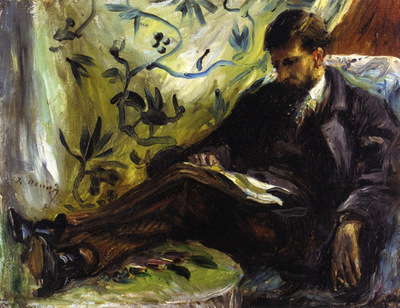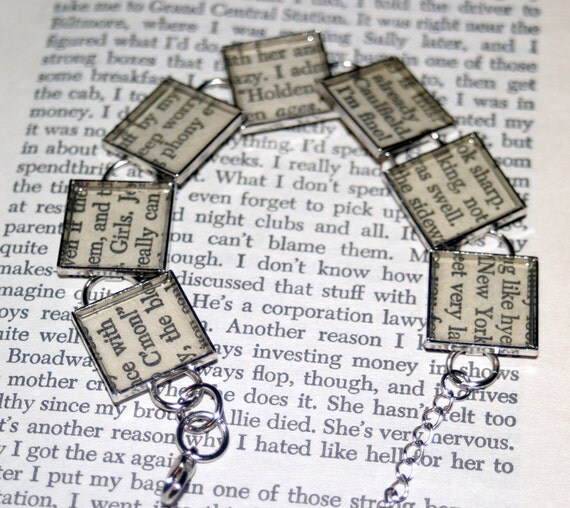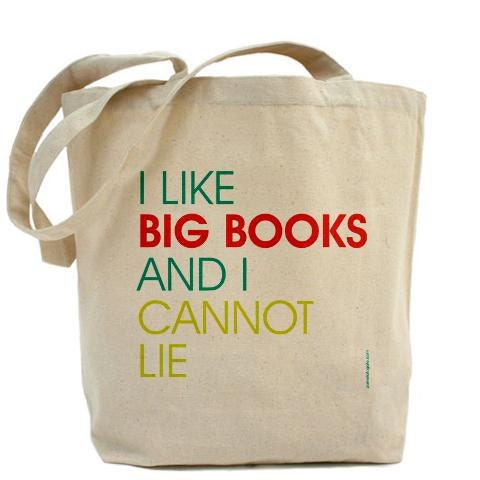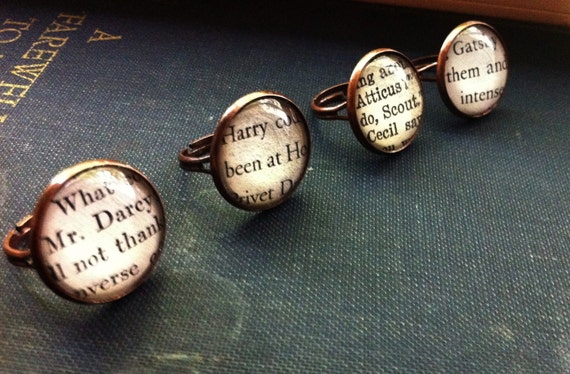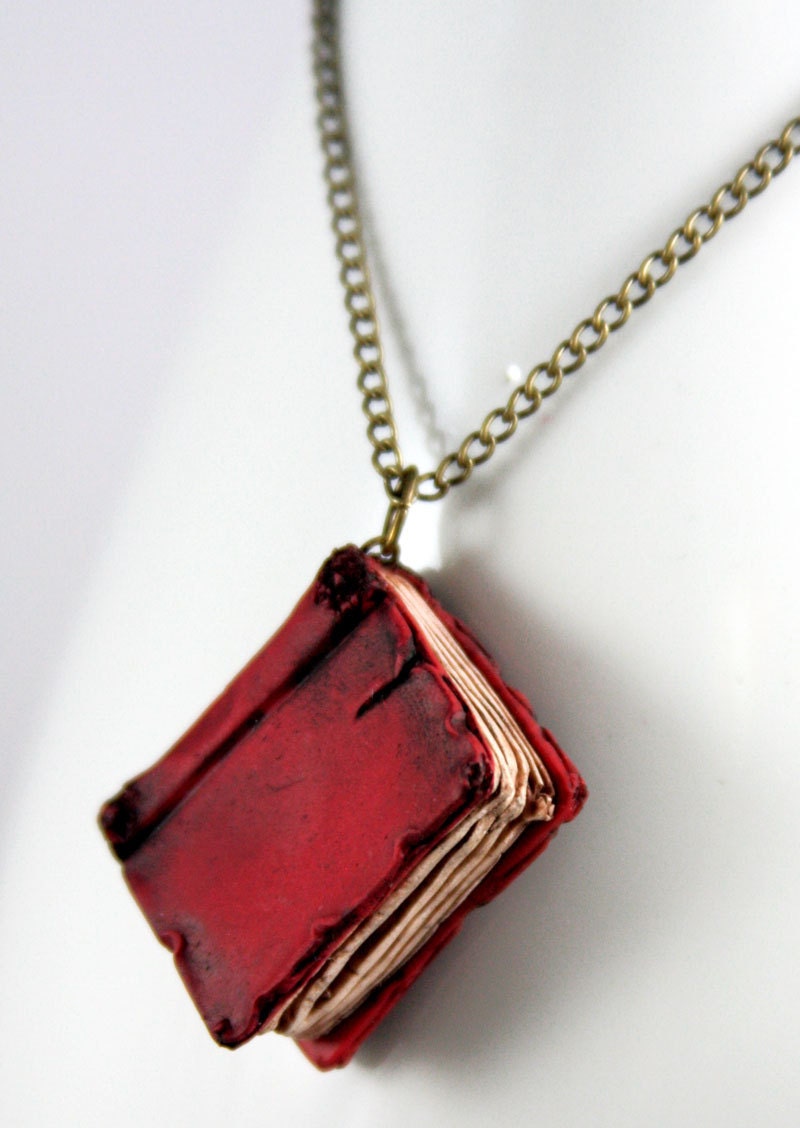
Tuesday, December 13, 2011
Unbearable Lightness?

Can your old book do this?
Monday, December 12, 2011
From the Pen of William Faulkner
"They stand in rigid, terrific hiatus, the horse trembling and groaning. Then Jewel is on the horse’s back. He flows upward in a swooping swirl, like the lash of a whip, his body in mid-air, shaped to the horse. For another moment the horse stands sprattled, with lowered head, before it bursts into motion. They descend the hill in a series of spine-jolting jumps, Jewel high, leach-like on the withers, to the fence where the horse bunches to a scuttering halt again."
"Back-running, tunneled between the two sets of bobbing mule ears, the road vanishes beneath the wagon as though it were a ribbon, and the front axle were a spool."
"The sun, an hour above the horizon, is poised like a bloody egg upon a crest of thunderheads. The light has turned copper, in the eye portentous, in the nose sulfurous, smelling of lightning."
"When I reach the front he is struggling with Gillespie, the one lean in underclothes, the other stark naked. They are like two figures in a Greek frieze, isolated out of all reality by the red glare."
Sunday, December 11, 2011
Shelf Actualization: One Month In

Well, it’s been exactly one month since we reached launch velocity here at ShelfActualization.com. And over the course of 37 posts, we’ve tried to make good on our bluster about becoming your home on the web for low-falutin literary delights and your gateway drug for literary fiction. As you can see above, we’ve already highlighted some amazing authors, and dozens of others have been mentioned along the way. And there’s a lot more to come.
But the reception has been a warm one, and we want to thank all of you who have commented, emailed, participated in contests and just taken a few moments to check out the site.
Saturday, December 10, 2011
NaNoWriMo Wrap-up: Interview with Natalie Field
NaNoWriMo Wrap-up: Interview with Jason Black
NaNoWriMo Wrap-up: Interview with Mike Kroll
NaNoWriMo Wrap-Up: Interview with Fiona Webster
NaNoWriMo Wrap-Up
And Robert Louis Stevenson’s Dr. Jekyll and Mr. Hyde was scratched off in just 6 days! Yeah, you’ll tell me, but the thing’s only about 100 pages long. That’s true, but at Stevenson’s pace, an entire month's work would have yielded a 500 page book of roughly 125,000 words. So, it is definitely doable.
Friday, December 9, 2011
First Line Friday!
“See the boy.”
In case you missed it, that’s the first line: “See the boy.” That’s it. And guess who wrote it?

Cormac McCarthy in Blood Meridian, one of the richest, most insanely beautiful novels ever written. And yet, the first line is extremely lacking. It’s too plain, too Biblical, too meaningless. “See the boy.” Ok, I’ll see him. What’s the big deal? There is no implementation of any language that is intriguing in the least.
But I suppose that that's how life is sometimes . . . simply lacking.
In Colum McCann’s solid novel Let the Great World Spin, he states “good days, they come around the oddest corners.” Well, it’s the same with first lines. I fully expected Blood Meridian to have a drop-dead amazing first line. But it couldn’t be further from the truth.
But to be fair, the rest of Blood Meridian more than makes up for a blasé first line.
Thursday, December 8, 2011
Write what you know
In general, I think that advice is sound. Faulkner is the greatest because he imbues his small, Southern universe with universal humanity. Steinbeck does the same with rural California. Joyce with catholic Ireland. And so on.
But it seems that modern American "high literature" is much more narrow than that of the past. Instead of taking the reader to rural California, fictional Mississippi, or the depressing Pacific Northwest (Carver), the reader always ends up in either New York City or a college English professor's office. The universe of settings and motifs has seemed to shrink, not expand, with globalization. Part of me thinks this has to do with the "write what you know" commandment. If all American writers today are university professors or New York City residents, what else can they write about? Maybe we need to find ways to support writers who have jobs other than pointy-nosed professor or Brooklyn hipster.

I, like Tucker, am somewhat ambivalent about Jonathan Franzen's Freedom. Part of my ambivalence is that the book, while very not short, seems narrow in its impact. It doesn't touch the pulse of the country in the same way that Faulkner or Steinbeck do. The book reveals much about modern life in NYC, but maybe not as much outside of it. Even though half of the book is set in Minnesota, is seems that the denizens of that frozen tundra are really NYC residents - they just don't know it yet.

I'd love suggestions on new (last decade) American literature that breaks with the academic NYC mold. My personal favorite is Marilyn Robinson who writes about small-town midwestern women. But Marilyn doesn't exactly break the mold - she's a professor at Iowa.
Haiku-ption Contest #2
Wednesday, December 7, 2011
Re-reading Faulkner
“Meet Mrs. Bundren,” he says.
I rarely reread anything, and can’t say that I’ll make it a practice. But with this book in particular, a stream-of-consciousness tale told from the heads of fifteen narrators with a slightly jumbled timeline, I was absolutely floored by the amount of color and texture and depth that had gone unnoticed on my first pass through the book. Maybe I agree with Nabokov on the subject of re-readings after all.
Tuesday, December 6, 2011
The Art of the Pseudonym
So what criteria should you choose as you construct your pen name? There is really only one:
So blow it up in the comments. What are the coolest pen names you can come up with?
Monday, December 5, 2011
The Science of Powerful Prose
Lots of intangibles fall into this hard-to-describe, "I know it when I see it" category: physical attraction, musical beauty, humor... We're coming to know, for example, that facial beauty has something to do with our expectations of symmetry and proportion. Musical combinations strike us as consonant or dissonant based on the intervals between the notes’ frequencies. We seem to find humor in things that violate our social norms without threatening us or our worldviews.
“Here we leave solid ground. Who can confidently say what ignites a certain combination of words, causing them to explode in the mind? Who knows why certain notes in music are capable of stirring the listener deeply, though the same notes slightly rearranged are impotent?”
My best guess is that for a line to really jump out at you, it has to provide a striking contrast with the lines that surround it (it has to surprise), and paint such a perfect picture, that in hindsight you can’t imagine it having been put any better way (it has to feel inevitable). Most, if not all of the jaw-dropping lines I've come across would measure up to that standard pretty comfortably.
Sunday, December 4, 2011
Don't Quit Your Day Job
It's a pretty odd assortment, to be sure. But it got me thinking about day jobs in general. There are a handful of professions that seem to creep up in the bios of a lot of famous authors. I think I may just do a series on some of the most common ones. Stay tuned...
In the meantime, what's the craziest day job you've ever held? Shelf Actualizer Orlando and I once served as hot-dog, nacho and churro mongers in a municipal swimming pool snack shop. Yep. I have lived the dream.
Saturday, December 3, 2011
Contest Follow-up
Friday, December 2, 2011
Leed la Revolucion!!!
 Thanks to the cascading revenue stream that is this blog, I'm taking an all-expenses paid trip to Cuba next week. I feel like Hemingway, only without the shotguns, sadness, and sexism.
Thanks to the cascading revenue stream that is this blog, I'm taking an all-expenses paid trip to Cuba next week. I feel like Hemingway, only without the shotguns, sadness, and sexism.Last night I went to my local library to check out some guidebooks. While there, I glanced at potential literary companions for my Lonely Planets. But I suck at picking travel lit - I always end up with some bizarre combination of book and locale. Help from our global readers would be appreciated.
Here are the options as I see them:
1. SETTING-BASED READ - Reading a classic English-language novel set in the current location. For instance, reading The Sun Also Rises in Spain, The Quiet American in Vietnam, or New Moon in Forks, Washington.
Pros: You know what to expect - a fantastic read. The setting pops even more when you are there.
Cons: It feels a little contrived. If I'm going to re-read The Old Man and the Sea, I might as well be taking a "Hemingway Bus Tour."
2. AUTHOR-BASED READ - I could read the classics in Cuban literature. Alejo Carpentier is considered the greatest Cuban novelist of our time.
Pros: This seems a more authentic choice than the prior one; less anthropological. It can set up the emotional nature of a country.
Cons: Reading foreign novelists, while often rewarding, can be deceptively difficult. While I like Murakami and Pamuk, I can't shake the feeling that my foreignness holds me back from embracing their core.
3. BEACH READ - I can always say, "screw it, I'm going to read about Girls with Dragons for Tattoos."
Pros: Easy read. I can pick up the book on my layover in Des Moines.
Cons: Why am I wasting my time in (amazing foreign locale)
4. HISTORICAL READ - Learn about that time that Che and Fidel played a round of golf after right after they did the revolution.
Pros: Informative; educational; substantial.
Cons: Informative; educational; substantial (while in amazing foreign locale)

First Line Friday!
'The news about Walter Berglund wasn’t picked up locally - he and Patty had moved away to Washington two years earlier and meant nothing to St. Paul now - but the urban gentry of Ramsey Hill were not so loyal to their city as not to read the New York Times.'

- I love the name Walter Berglund. Not sure why. It’s cumbersome, to be sure, but it sticks. Walter Berglund. Sounds American. Sounds like a protagonist.
- I love how much this sentence says: There is a guy named Walter, he had a wife named Patty, they had lived in St. Paul, then moved to DC, and there is some unforeseen “news” that we’ll learn about later in the novel. It’s actually quite a lot of information for one line, but it’s smooth and eloquent. Not unruly or overly burdensome.
- I love the phrase “the urban gentry of Ramsey Hill.” The phrase so accurately depicts white people coasting through St. Paul in an Audi on their way to Starbucks prior to attending their daughter’s lacrosse game. It says all of that in 6 words: The Urban Gentry of Ramsey Hill. Love it.
Thursday, December 1, 2011
A Quick Holiday Gift-Giving Guide
I know, I know, I know...
I know what you're thinking. Why would anyone need to look any further than the Shelf Actualization Shopping Page for their Holiday gift-giving needs? I get it, I really do. We have some awesome T-shirts:
But what if you're the second or third person to buy someone a Shelf Actualization T-shirt this year? (This happens all the time.) Do you really want to be that guy? You see where I'm going with this.
So, we've pulled together a few other ideas for booklovers everywhere. Read on.
If you're bound and dertermined to give a T-shirt to a loved one, might we suggest you take a look at Out of Print Clothing? They have an awesome array of vintage book-cover Ts for men, women and children.
And speaking of books, why not give some of them away? I'm not talking about the overhyped stuff on the front tables of your local bookstore. I'm talking interesting books they won't get anywhere else. You can take advantage of Dalkey Archive Press's amazing Holiday Sale. They are offering any 10 books for $65, and any 20 books for $120- shipping included. Tucker's reading one right now.
Or you could give the gift of early adoption. Why not get that special someone the hot new eReader?
Or, you may want to go for something truly unique. You could pick up a "literary scent" from the good folks at I Hate Perfume (H/T to BookRiot). Choose from In The Library, a scent that "is a warm blend of English Novel, Russian & Morrocan leather bindings, worn cloth and a hint of wood polish," or A Room With A View, which "captures the scent of the hills above Florence- the vineyards, the wild grass, the finocchio, the hot dusty Florentine earth. And of course a torrent of Violets...
And if you don't find what you need there, there's no end to unique gifts for booklovers on Etsy. Here's a smattering from my ten minutes of dedicated research:
The Catcher in the Rye Recycled Book Bracelet:
The To Kill A Mockingbird Book Purse:
The book bag that simultaneously pays homage to War and Peace and Sir Mix-a-lot:
You've got your Vintage Book clocks:

Your Vintage book rings of all sorts:
Wednesday, November 30, 2011
The Modern Library List- By the Numbers
Here is how the books break down by decade of publication:
Here are the authors who landed multiple titles on the list:
And finally, here is how things break down across geo-political boundaries*:




